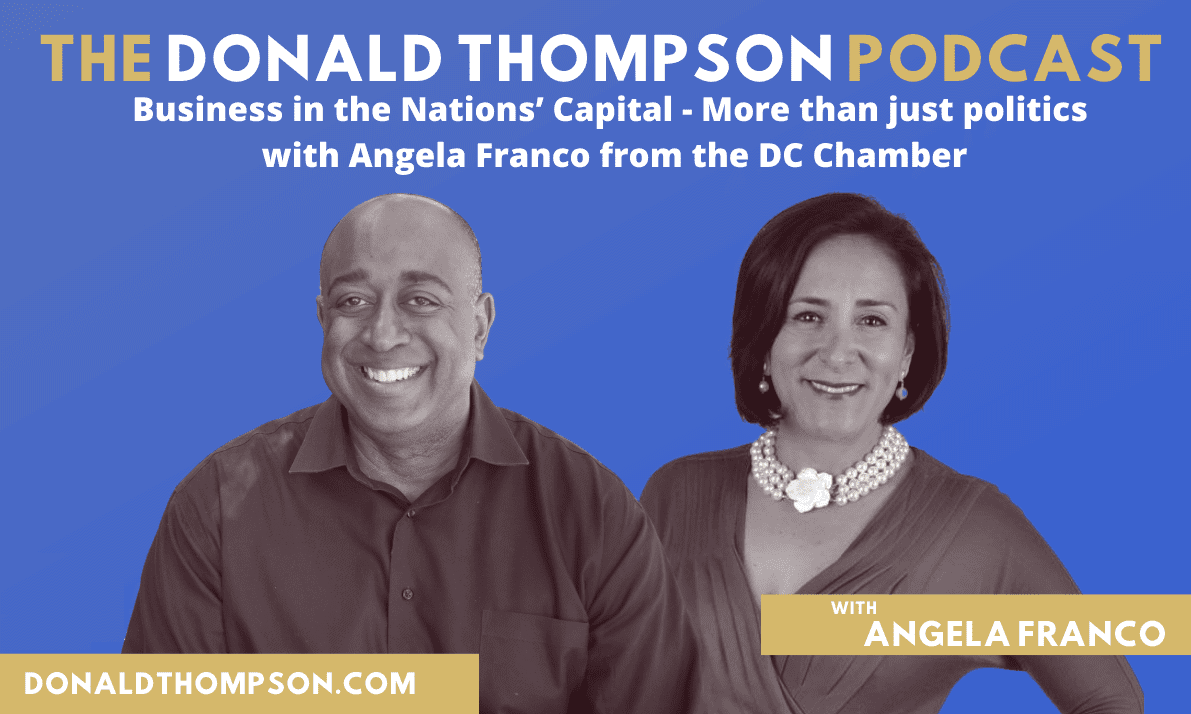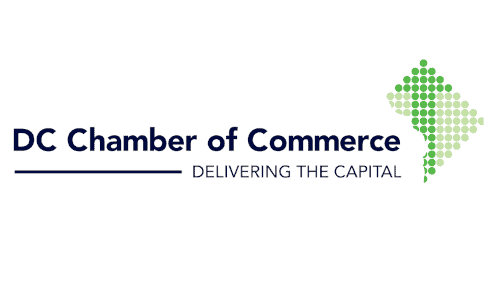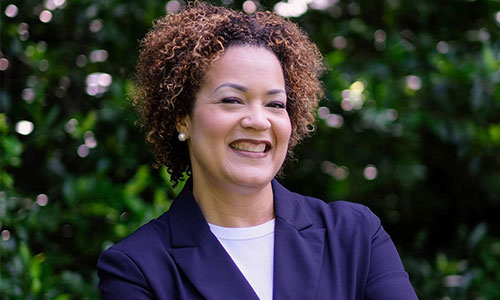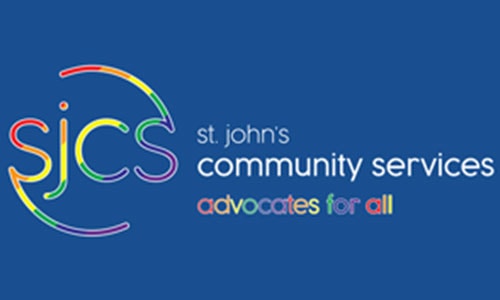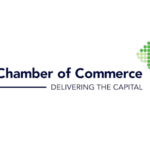When Angela Franco was a growing up in Columbia, her father would tell her, “Don’t think that you’re better than anybody else. If you want to go someplace, you’re going to have to work for it.” That made her upset at the time, but it turned out to be a gift – to keep her grounded and treat others with respect. Now as the DC Chamber of Commerce President & CEO, Angela works with companies of all sizes and leaders of all backgrounds to grow the Washington DC business and entrepreneurship community.
The Donald Thompson Podcast is hosted by The Diversity Movement CEO and executive coach Donald Thompson, and is a production of Earfluence.
Donald Thompson: Welcome to the Donald Thompson Podcast. I am really excited about today’s opportunity to share with Angela Franco, president and CEO of the DC Chamber of Commerce. Angela, welcome to the show.
Angela Franco, DC Chamber: Thank you so much for inviting me. I’m very excited to be here.
Don: Oh, fantastic. One of the things Angela that we like to do, and we’ll kind of balance our time together, uh, into three levels. First I want to give you some space and really just share about you as an individual. Then we’ll talk a little bit about the business and the work of the chamber. And then we’ll talk about a couple of global things that are going on and kind of wrap things up.
So first talk to us a little bit about you. Family, education, where are you from? Anything that we wouldn’t necessarily see on the LinkedIn profile?
Angela: Oh, yeah. So I was born in Berkeley, California. And my dad was getting his PhD in education. We moved back to Columbia right after I was less than a year old. I was under a year old and that’s where I grew up. I did school. I went to an American only, girls, run by nuns school. Okay. So we always talk about the guilt that we grew up with, with all my girlfriends.
So I basically went through the same school all my life, and I still have all my friends from school. That is one of the greatest gifts I bring. I have two best friends, one that I met when we were six years old. And another one that I met when I was 11 years old and they have been my friends for life. I grew up in a big family. We were six siblings, three boys, three girls. My parents were, you know, my father was an educator and my mother was a journalist and we grew up amongst Jesuits.
And I come from a line of like strong women. Even, for example, my mother, my aunts, they had, they had great education. They went to school and um, my mother finished a master’s, my aunt finished a PhD. So they were, you know, since then education has been a big thing in my family. I think that was like, the most important thing to be educated and on top of that to behave well, to look good and to serve the communities.
So it was, uh, it was, I grew up in a very peaceful environment, loving environment, and you know, I’m always, I’m always grateful for that. I’m not going to say that it was easy, but obviously when you grew up in a stable environment, things, you know, start with the right, with the right foot.
Don: Well, that is fantastic. And thank you so much for, for sharing that. One of the things that, as I looked at your background, and things that were super interesting. Talk to me a little bit, talk to us a little bit about kind of that career rise, right? You’re a CEO now, right? CEOs don’t start as CEOs. So what are some of the things that led you to your current role uh, as a CEO of a, of a nationally recognized chamber of commerce?
Angela: Yeah. So it’s interesting you’re asking me that. I was having a conversation last night with a friend of mine, and he was telling me that his family and his mother told him that he was great, and he was wonderful since the start. My parents were very realistic. They would tell me what didn’t work. You know that we’re not always like, oh, Angela, they love me and I knew it, but they will point out things that I needed to work on.
And my father always said something that in the moment it made me mad, but now I understand he was like, Angela, don’t think that you’re better than anybody else. Don’t think that you’re more than anybody. If you want to go someplace, you’re going to have to work for it. So, you know, listening to him yesterday, I never saw that as a gift, but now like, it’s, it was really a gift. We’re all grounded and, you know, I can tell you that my six siblings and I are all successful in the way, in a way that we, you know, we prepared ourselves. We earn the spaces we’re in. It’s not something like it was, it was given.
I finished university, then I moved to the United States for a couple of years and it just didn’t work. It’s hard to move to a different country, but I needed to, I grew up in a very protective family and, you know, women were like set to get married. And that was not what I had in mind. Not because I was not thinking. I wanted to, but it just didn’t work out that way. You, so you see, you know, some people like they meet somebody and they fall in love for me, I’ve been very different than that, on that aspect.
So I just wanted to, to see the world a little more with my own eyes. So I moved to the United States. I lived in Miami, I lived in Puerto Rico two years, and then I moved back. I get my master’s in finance. And my first job was a job on my father helped me find, I have to admit it, in an insurance company, but it was a very, the lowest of the lowest of the entry, the first entry-level job you can find. And I remembered that my boss, at that time, she was a hardworking woman. She had a daughter; her husband was driving a bus. He owned a bus and she built her house with her hands.
You know, the, the economics in our countries where I come from Columbia are a little different. She lived in a part of town where she had to build her own house with her hands. Her husband was a bus driver and she was so honest, loyal. I learned so much from her, like really, I have to say that I learned so much from her and it showed me a different, a different aspect of a human being that I not necessarily had been exposed until that time.
And that’s really, when I see that my professional career started. The system, the pension system in Columbia became private. I did have a financial plan for the insurance company that I was working for to become one of those pension funds. And it was a lot of work and I didn’t understand the extent of what I was doing, but what I understand now is that that gave me a base for my professional career forever, because there’s still things. Once you understand finances and you understand how to predict numbers. It helps you greatly when you’re in the business world.
And then from there I moved to a bank. I worked in relationship building that gave me that love for relationships. And then when I was 31, That’s when I moved to the United States and I, I was in a national position for the pension fund that I had done the study for. And I was running all the special businesses. So, you know, people kind of go into a private fund. They can stay in a public fund, but there were special systems like the military, like the public hospitals, things like that. And those were the ones that I was working on.
So I was working in a national capacity, working with offices all over the, the, the country of Columbia, but I didn’t have, it was not, it was okay, but it was not meaningful for me. You know, it was like, you, you see, you get to a place that you’re like, okay, if I’m going to keep doing this, what happens?
Don: Yeah. no, I love it. I, I mean, one of the things that you described, right, is that journey of finding your calling, and we can all use different words and meaning and different things, but it’s really those things where work is an act of love where it’s not just work. It is, it becomes part of who you are. And I think that that is something that comes through as you tell your story and finding your way through those different pillars.
One thing that I would reiterate for our audience that I think was beautifully said is that when you understand finance and have to project numbers, it helps your foundation for any business endeavor you want to be, because that’s really the language of business, right, is, is finance and numbers. And so that is super powerful. And then what you talked about and learning about relationships, and working with those special programs, these are fundamental things, whether you’re a business executive, a leader in a nonprofit and entrepreneur, and education institution, all these things come together.
So, let’s pivot gears for a minute and talk to me a little bit about the DC chamber. Brag on the chamber a little bit. If I were coming into DC and looking at a new market, talk to me a little bit about the work that you all do for your member organizations.
Angela: So, um, the DC chamber of commerce is the oldest business organization in the District of Columbia. The DC chamber was founded initially years ago. It has been, it has been in existence for 83 years. It was created for the Black community, and then it has evolved through the years, and now we are the largest business organization in the district.
What the chamber of commerce does, that is unique is representing this small business community. So, you know, when you have, when you have an organization that has that, he seemed touch up here, but he’s in touch down here. You know, like you can go up and bring, you know, larger businesses and bring larger companies that can subcontract with his small businesses. And then we have the touch with the small businesses.
I am a banker by education and by profession, my professional career, and we have organized our problems. So we continue to organize what we offer to our business in three pillars. One for startups. So companies that have been in business up to three years, the second one for companies that want to grow, and we have partner with different organizations that provide certification for women owned on the federal government on the local level. You know, there’s, there’s also a certification in green, there’s international opportunities as well. And then the third pillar is for companies that are grown, that we can connect them with opportunities. So that’s the value. I mean, the value that that our chamber of commerce brings.
And on top of that, we have a very, very strong government relations committee. So we are on top of legislation. What happens in the district? You know, what legislation is coming up that is, can affect your business and really representing our businesses in front of the council and the mayor’s office.
Don: That is really powerful because a lot of small businesses in particular don’t really understand how the laws and regulations impact them. And what have you all, as an advocate is really, really powerful. And, and that, that is really, really awesome. One of the things to expand upon, when you think about chambers and I had this bias before I became more active in my local chamber.
You think about it as kind of a social thing, right? The chamber and business people get together. But what you described as significantly more active. You described your pillars, but then you also described certification. How you can connect all those different. How does somebody reach out to you? If they’re hearing this podcast reach out to the chamber, what are some of the tools where they can get to know some of the details of those pillars?
Angela: So, what we have is, well, obviously they can go to the website of the chamber. Once you become a member. We, our work is done through committees. We have an international committee, small business committee, membership committee, workforce development committee. That is a big area that we’re working on, construction. We started a women’s group last year, and government relations committee.
So anybody has something that they can get involved. And I think that I always, I always said, this is the second chamber I run. I run the Hispanic chamber before for seven years, and now I’m running the DC chamber up in year for two years. And I love the work of a chamber of commerce. That’s what I love the most about, is you can create whatever works for your businesses where you are. Right, but some chambers of commerce, I mean, I’ve seen it all because I, you know, some chambers of commerce do scholarships for students. Some chambers of commerce for me, a chamber of commerce is a place where businesses convene.
They talk to each other and they find opportunities, opportunities for what? Opportunities for growth, or how is growth east through certification or through contacts? Contacts, you know, for lending for additional opportunities for businesses. And the second pillar is government relations. And I am understanding I’ve been understanding much better through the DC chamber and my role here at the DC chamber, the importance, as you said, on the importance of government and the importance of policy.
And it’s just something that we have to, we just have to get involved and understand. Understand how is that going to impact my business, you know, what’s going to happen, you know, if you keep with ideals, you know, some members of the council, if you continue putting legislation like that, what’s going to happen with the business community.
And some people say, well, is that, you know, he’s a large corporation and it doesn’t matter. The business community is comprised of large businesses, small businesses, medium-sized businesses. Everybody’s part of the cycle. It’s not an, everybody has a role to play. So when you, you know, he’s like, it’s, it’s just something that for me is so important to, to always bring that message is we all have a role to play, you know?
Corporations, yes, they have more money, but he’s a way of giving back to the community, right? Getting involved, utilizing the procurement opportunities to support small businesses. And, you know, we all have to be mindful. Of what our, what, what we bring to the table, and what we want to get of something where we get involved.
Don: That is awesome. When you think about, you know, one of the things that came to mind, both when you talked about the DC chamber, but also the Hispanic chamber of commerce, there are a lot of large companies that want to diversify their supplier networks.
They don’t know where to look. They don’t know what organizations to help them do that, to find high quality vendors and partners, right, in the different areas. And so highly encourage folks to, to really dig in and use our various chambers to be a conduit, because you said very good. Convene talk and develop opportunities and, and keep it moving. So I think that is, that is, that is great.
Let’s zoom out the lens a little bit. There’s so much going on in our country. So much turmoil, a lot of good things for sure. But our politics are more divided than. Um, we obviously are dealing with the impact of Russia’s invasion of the Ukraine. We’ve been through a pandemic. Racial equity is on everyone’s radar now, uh, based on the 2020 as a catalyst year with some of the murders that occurred.
What are some of the things as a business leader is you’re looking at all of these things? What can we do to help make it better? Right. When we think as business leaders, like what are some steps that we can take? What are some things that you’re encouraging your members to do and learn when those topics come up in that business conversation in context?
Angela: Self-consciousness. I know it’s a very deep word, but it’s true. I mean like the, the, the problem that I see is that, the lack of self-consciousness that we all have, you know, it’s just that confrontation with you and saying, okay, where is my space?
We all have a place, right? We all do. We all have a place. We all have a role. And is what is our role, and why, what I am biased about, we’re all biased about something, right? It’s not necessarily against Latinos or women or, you know, Black or white, or I think that he’s against something. And I have my bias too.
So it’s being conscious about it, and when that happens, you know, Open about saying, okay, I’m biased about something, but I’m going to accept it somehow. We don’t have to be friends with everybody, but we have to respect life, respect human beings, right. And respect where everybody comes from.
You know, I I’m very respectful of the community, but they cannot push me to agree with everything that everybody said. I have the right to believe in what I believe in. Right. What I see sometimes is that they want some people want us to believe what they believe. And that’s another mistake we make. I don’t want, you have your beliefs. I have my beliefs. I respect yours. You respect mine. And we have to come to a place where we all live in that space. I think that, I mean, honestly for me and what I go and do every day, what I, me as a leader now that I’m conscious that I’m a leader that I work all the time, because I mean, part of my development to become a leader because I’m the president and CEO of the DC Chamber of Commerce.
But I, the way I look at myself now, And I understand about me is that I’m a, I’m a leader, but I’m a leader from the heart. And basically when you, when you become, when you understand you’re a leader, is that transformation that comes within, and it’s something that you work on every day, right? You don’t just, don’t go out and say, I’m a leader because I’m a leader because it doesn’t work that way, right. People can read your eyes. People can read your, your energy. I mean, it’s just the way it is.
Don: That’s right.
Angela: Right, and he’s like, no, no, no. I mean, you’re a leader from within, and I start that when I was very young. I mean, I grew up in a family where we were based with Jesuits, one of the principles of the Jesuits – two, I’m going to tell you two, one is self-conscious.
And the other one always look for the well-being of the community. Sometimes when you look for the well-being of the community, you sacrifice something personal, but he’s like, what, what goes first? I mean, you can be in great shape, but if your community’s not in good shape, so what? Doesn’t have any meaning in my life.
So I started like my, my process of growing as a person. Like, I always look, you have like two glasses, right? One glass is what you show and whatever that can be full, but the other class that needs to be full so that it doesn’t fall is your inside your soul, your what, and how do you feed your soul? You feed your soul through the transformation, through self-consciousness through faith, through God, whatever everybody wants for me it’s God, it’s my faith. I always, I do every year, something on leadership or something that can feed my soul, like I do with my intellect, like I do with my body.
So that’s, you know, that’s what I think we’re missing. That part we’re missing. Plus social media is not helping, because when you look at social media and you’re like, you see all these people doing these great things and I’m like, you know, everything can be posted in a picture, but that doesn’t reflect the picture of your soul.
That for me is something that I always look because believe me, it gets to all of us. So it’s like something I’m like you know, what is it? So instead of focusing on that, I focus on what I can do with me to keep my strength, to keep my values, to keep, you know, being honest, even under the circumstances and the pressure that I may confront.
Don: That is awesome. The, the thing a lot of businesses, a lot of leaders, it is more acceptable to talk about wellness, to talk about mental health to talk about, we can all use different words, feeding one’s soul, feeding one’s consciousness, but really it’s how do we become and think about more than what we post on social media, the superficial, the external.
How do we deal with the things that are lasting, and create that opportunity to continue to improve? And I think as leaders, we have to set that example and there’s a humility and humbleness that is required in leadership today, so that people trust where you’re coming from enough to really share with you, to really be with you at a deeper level.
And so I really appreciate the way that you described that, and we all do have our beliefs, our perspectives, and it’s how do you have that space, right, for the things in your experiences and acknowledge, right. And appreciate the differences in others. And the thing that I try to do, and it doesn’t make me better than anyone else, but I don’t have a judge’s robe.
That’s not my calling, my calling is to understand people and like you described, to be a good value for the community that I’m in. And when we start with trying to understand and appreciate others, it gives us more room to find the things that we have in common. But if I start out as your judge, that I’m only looking for things I don’t want, and that doesn’t create a lasting relationship. So I really appreciate what you described in the way that you did, because leadership has lots of pressures and a lot of times leaders crumble under those pressures because they think it’s perfection versus progress. And I’m a believer in progress.
Angela: Me too, and I’ve met people, you know, I’ve had the opportunity to really get, I like getting to know. I like understanding where they come from, you know, their families and, you know, I mean, people think you don’t, you cannot tell. I mean, you can, can’t you tell Dell when, and I, you know, I, I had a friend and he, you know, he was a politician and whatever, and I was like, how people cannot not to do respect him or anything, but you know, I’m saying our leaders have to be thoughtful, you know, have to connect with the people and understand what they’re great at and what they’re not good at. You know, if they’re not good about certain things, at least say, you know, I’m not going to get involved here because this is not me.
What he’s mean is this, so that’s, those are the things that I think we all have to come to an understanding. Not just because you want to be in front of that is because it’s really meant for you. And I, I mean, I I’ve been always like that. I’ve never, I mean, I’m, I’m very ambitious, but I’m ambitious personally.
If that makes sense, I want to be a better human being. I want to be a better mother; I want to be a better friend. I’m ambitious that way. I’m not ambitious. Like, oh, I want to like have my eye in that position. You see what I’m saying? I’ve never been like that. I’ve always been more ambitious in, in that sense, that I want to find more inner peace that I want to be, you know, with the people I really want to do that I want to be able to set up limits and to start, you know, living my life the way I’m supposed to.
Don: That is powerful. The last question that I have during our time. Talk to me about someone that you admire and why, and it could be business, it could be personal, but somebody that gives you inspiration to be that better person or leader, and why.
Angela: Well, I think that the person that I think about all the time is my father. So as you know, he built his career from down up and he was a person that, We, a lot of people like I’m not going to say criticized, but my father was very quiet doing what he needed to do. He, um, obviously with my mother supported, my mother always got upset because we never mentioned her, but my mother was an incredible source of keeping the family together, being at the house.
And that helped my dad to develop what he needed to develop, but my father grew up in a family with no resources. He went to a, different than my mother, my mother was born with a, with a silver spoon in her mouth. You know, they said that, but she grew up in a different environment. My father really didn’t grow up with a lot.
And uh, her mother sent him to an internship with the Jesuits and he ended up, you know, speaking seven languages. He finished his PhD and then, uh, he had a situation once where, you know, he was really not valued. And he was like, he kept his head up and he said, that’s fine. He didn’t fight anybody. And then that’s when he said, you know, I’m going to.
I’m going to build a school that he’s going to have the best education. So he founded a school. We all helped our six kids. And we, now we have a school in Columbia with 700 students. My sister is joining it, but for me, you know, we have it now. That’s a different story. But for me, it was more the way it started, because keeping it is one thing, starting something is a whole different thing against all odds.
So I really, you know, every time I’m in a situation that I’m in a situation where I wanted to respond or where I feel I’m not respected. I always go back to him and the way he handled that; he was very humble. And he always told me, remember where you came from. And he was like, you’re not better than anybody. And still to this day when I’m out, I always think I’m not better than anybody else. I just have to strive every day to do the best I can.
Don: That will be Angela, the last. That is awesome, right? I, I, I love that that story and 700 students is a powerful legacy building for your father that will just continue to grow, grow on. Thank you so much for spending time with us, for authentically sharing your perspective, both on leadership, certainly the DC chamber, but I’ve gained the most from this dialogue just getting to know you. And some of the foundations that make you that authentic leader.
So Angela, thank you for being a part of the Donald Thompson Podcast and we wish you nothing but the best. And if we can ever be of help in any way or any of the things that we’re doing, we are hopeful that you’ll call on us.
Angela: Thank you Don, I appreciate it because you are a very warm person and that makes it easier. So thank you.

